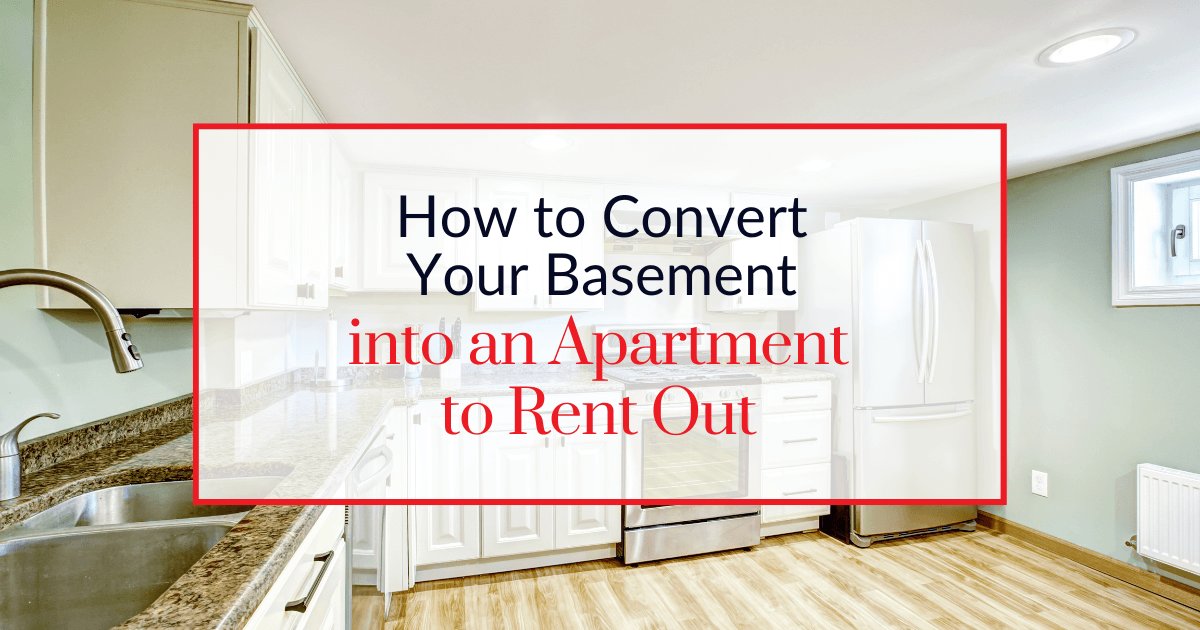How to Turn Your Basement Into an Apartment: 4 Easy Steps
Posted by Justin Havre on Wednesday, October 19th, 2022 at 8:03am.

Converting a basement into an apartment with kitchen and bathroom facilities allows homeowners to earn extra income if they rent out the space. A home with a basement suite is also highly likely to increase the property's value, especially if the owner wants to sell one day. However, the proper permitting needs to occur before the conversion, and owners should be comfortable being a landlord, as they will be renting a portion of their home to a tenant. For anyone thinking about converting a basement into an apartment, here's how to do it.
Is It Legal to Convert Your Basement into an Apartment?
The answer to this question can vary from one municipality to another. In municipal areas where basement apartment conversions are allowed, there are usually multiple permits required to complete the process:
- Development permit
- Building permit
- Homeowner permit
- Contractor trade permit
This permitting process ensures the safety of the dwelling and is essential for some of the following steps. The permit expires if the improvements to convert the basement into a secondary suite are not completed by the deadline. The homeowner may need to reapply for the permits and pay fees a second time.
There are other things to ask about before converting a basement into an apartment. For example, many municipalities will only allow a property to have either a basement apartment or a backyard apartment, but not both. In many cases, homeowners may only convert a basement into a single apartment rather than two or more smaller units.
Inspect the Space

Is the basement ready for conversion, or do improvements need to be made first? For example, there will be municipal ceiling height requirements to meet. If a basement ceiling is too low, the owner may have to dig down or raise the home before converting the space.
Windows need to be the right size so that occupants can escape in the event of a fire. Humidity and dampness in a basement are also important factors for a renter's comfort. The best humidity range inside a home is 40 to 60 percent. The basement should also be inspected for mould because basements are inherently damp. Mould remediation may be necessary for a tenant's safety before building.
Because of the dampness in basements, wood rot tends to set in. This is another problem that should be inspected before starting the conversion process. If the floor joists, wooden window plates, or other wooden features are beginning to rot, replace those first.
Air quality is also a critical consideration. If an HVAC system is in the basement, have the air quality tested to ensure safety.
Determine the Floor Plan
When creating a floor plan, the owner should consider everything they would want from a regular apartment. For example, to make a basement apartment more attractive to most renters, it should have a separate entrance from the main house. A full kitchen with a dishwasher is another way to impress renters and command a higher rent price. The same goes for an in-unit washer and dryer.
Basements tend to be colder than the rest of the home, so a gas fireplace is another upgrade to consider. However, this also requires a natural gas hookup, so keep that in mind when planning the space. What's the shortest distance to connect a gas fireplace to city services? That's where the fireplace and living room should be situated.
When it comes to a bathroom for a basement apartment, a shower/tub combo is more impressive to renters than a shower or a tub by itself. Additionally, an open floor plan makes a basement apartment seem larger and takes better advantage of natural light.
The owner also has to work within some obvious size constraints. It can be helpful to work with an experienced contractor to develop a floor plan for a basement apartment.
Add Heating, Cooling, Electrical, Plumbing & Insulation
Next, install all the necessary utilities according to local building codes. Basements are often one of the most neglected parts of a home, so electrical outlets and sockets might be old or out-of-date when it comes to more recent codes. Heating, cooling, electrical, and plumbing are necessary before one even considers renting a basement unit. Effective insulation on the walls will also be essential to save energy.
Utilities for a basement apartment will almost always hook up to the main home's utilities, and the owner will need to decide how to charge for them. Will a flat fee be added to the rent to cover water, gas, and heat? Or will the renter be charged a percentage of each utility bill every month?
Once the utilities are hooked up, it's time to put any last finishing touches on the basement apartment and install any necessary appliances. Once a basement apartment is ready to rent, it should have all the amenities someone could expect from a regular apartment building.
Converting a Basement into an Apartment Is a Good Investment
There are several great reasons to convert a basement into an apartment. Renting part of the home's space to someone else can reduce the monthly mortgage payment. It also adds a decent amount of value to the home's worth. The main thing to remember is that owners should follow all local building codes to ensure success, from the beginning of the permit process until the first rental contract is signed.

